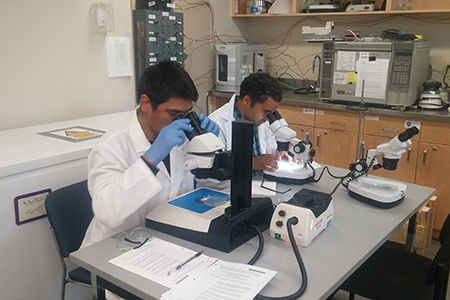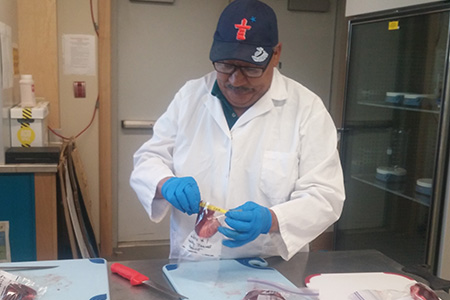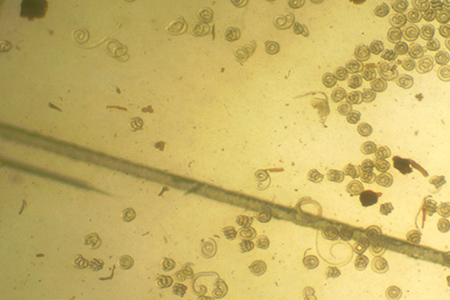Nunavut Trichinella Diagnostic Program
Since 2017, Nunavut Arctic College and Nunavut Tunngavik Incorporated (NTI) have worked together to offer a unique Trichinella diagnostic testing service for Nunavummiut. Trichinella are tiny nematode parasites that can infect most mammals and some vertebrates including birds and reptiles. Trichinella are present throughout the world; and the species of Trichinella found in the Arctic (Trichinella nativa) is known to infect a wide range of wildlife including Walrus, Polar Bear, Foxes, Wolves, among other marine and terrestrial mammals. Trichinella nativa have adapted to Arctic conditions and can survive for long periods of time (years) as dormant larvae in the muscle tissues of an infected animal even after the animal has been harvested. Trichienlla nativa can also survive for long perios of time in frozen tissues. People who consume raw, frozen, or undercooked meat from an animal infected with Trichinella might become sick with an illness called Trichinelosis (or Trichinosis) if they ingest larvae. There have been manny documented outbreaks of Trichinelosis (also called Trichinosis) in Nunavut and other Arctic regions linked to the consumption of infected walrus and polar bear meat.
The only way to find out whether an animal is infected is by identifying the Trichinella larvae in that animal's muscle tissues. The NRI's diagnostic program uses a laboratory technique developed by the The Canadian Food Inspection Agency (CFIA) called the Double Separatory Funnel Procedure which is specially designed to detect Trichinella larvae in animal muscle tissues. The NRI provides testing for Walrus and Polar Bear; although the diagnostic procedure can be used to detect trichinella almost any mammal. The NRI's diagnostic program follows a quality assurance plan, and all of our local analysts complete proficiency evaluations twice each year with the Canada Food Inspection Agency. This ensures that our analysts are competent and capable to provide this important service to Nunavummiut. NRI and NTI are working to help prevent Trichinelosis infection and to support Nunavummiut in enjoying their traditional country foods. Beginning in 2023, Nunavut Arctic College’s research laboratory in Rankin Inlet was equipped to provide trichinella detection services for Kivalliq communities!
As of December 2023, NRI and NTI have tested 340 walrus, 65 polar bears & 1 Killer whale (Orca) from 16 communities. Out analysts have detected Trichinella parasites in 11 walrus,36 polar bears & 1 Orca which has allowed the Department of Health to issue advisories to help prevent Trichinosis outbreaks. Having a diagnostic program in Nunavut operated entirely by community members allows for much faster return of test results to Nunavummiut. To help encourage participation in the testing program, Nunavut Tunngavik Incorporated pays harvesters $150.00 for each tongue they submit for testing.
NRI and NTI's analysts also deliver hands-on Trichinella diagnostic workshops and demonstrations to NAC students, researchers, and other interested groups. Contact us at any time if you'd like a demonstration or a tour of our laboratory!
Nunavut Trichinosis prevention program requires close collaboration between the College, NTI, the Departments of Health and Environment, the Canada Food Inspection Agency (CFIA), local HTOs, and individual harvesters throughout Nunavut.
To learn more about how to collect and submit wildlife samples for testing, click here (English) or here (ᐃᓄᒃᑎᑐᑦ). Please be sure to include a sample submission form (English or ᐃᓄᒃᑎᑐᑦ) with every sample you send us for testing!
|
|
|
|
|




